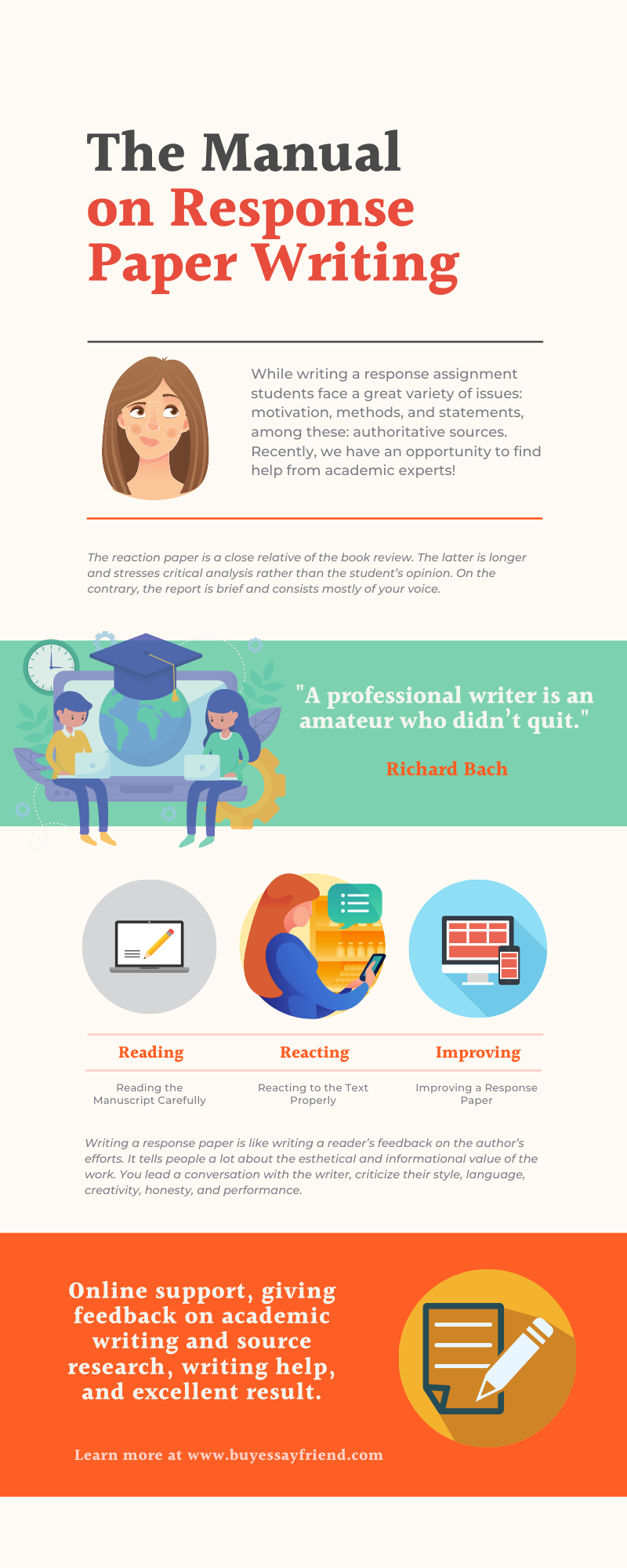The Manual on Writing Response Paper Assignment
Break the Book Down to Letters
The response essay is a short summary of the author’s ideas with your reaction. It’s usually assigned when you’ve already read several studies or articles on the subject. You investigate a particular book, using the knowledge you’ve got from lectures and applying the story to the present society agenda.

The reaction paper is a close relative of the book review. The latter is longer and stresses critical analysis rather than the student’s opinion. On the contrary, the report is brief and consists mostly of your voice.
Your reaction can include this:
- life and personality of the author
- the topic of the piece
- circumstances that prompted its publishing
- a summary of the plot with your explanations
- author’s and your views
Reading the Manuscript Carefully
Make notes while reading. Mark passages that were new or emotional to you, that pulled certain memories out from your mind. Read selectively: include key paragraphs and pass by details redundant for your essay. Brief scratches will come in handy at the next step.
To separate the wheat from the chaff, ask your book the questions below.
Topic
- What’s the subject the book runs around?
- What problem does the author ground their speech on?
- Is the book about personal experiences? Is it research? Fictional story?
Argumentation
- Are the claims well-supported? Do they persuade you, and why?
- Can you easily understand what’s going on? Do you need prior knowledge to read it?
- What was new to you? What contradicts your worldview?
Opinion
- What does the author like or dislike?
- Do they open our eyes to something important? Do they try to teach us?
- Does the writing follow or challenge the established points of view?
Comparison
- Which stories can you name similar to this?
- What distinguishes the book from its peers?
- Where do the authors meet? Where do they argue?
- Could one opinion win over the other, and why?
Estimation
- What does the manuscript feel like? Which similar situations do you remember?
- Is the writer inclined to prejudice?
- Can you name a few writer’s traits?
- Is the story relatable today?
- Are you satisfied with reading it? Who else can benefit from the book?
Reacting to the Text Properly
Obviously, claiming that you “like it” is not enough. Your response must fill at least half of the essay. Here what you should include in your evaluation:
- whether the information from the book complies with the knowledge you’ve got from lectures, research papers, textbooks;
- if you learned something new;
- a related experience from your life, news, history;
- whether it can apply to our times;
- whether you agree with the author’s point and why;
- if the writing serves its central purpose: provokes feelings, roots up some old ideas;
- who, in your opinion, should read this book and why.
Improving a Response Paper
Finally, there are small details that each of us remembers until getting closer to the essay. A list to remind yourself:
- check the instructor’s prompt and word count;
- analyze a good example of a response paper;
- make sure your thoughts are organized and don’t conflict with each other;
- clear your essay of unnecessary information, split big paragraphs and merge small ones;
- support your statements with quotes from the text;
- follow one formatting style determined by the professor;
- insert fragments from the book in their original meaning;
- include the bibliographic information, the list of references;
- proofread before submission.
A response paper is a reader’s feedback on the author’s efforts. It tells people a lot about the esthetical and informational value of the work. You lead a conversation with the writer, criticize their style, language, creativity, honesty, and performance. You can estimate their contribution by putting it all in a bigger modern context. It takes much time to complete one page, but just enough to cast light on the state of present literature.
